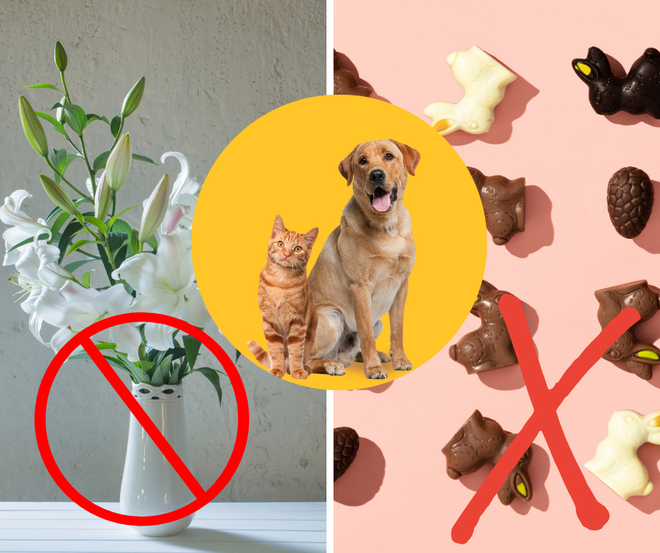Poison reports for dogs surge 200% at Easter: What to know to keep dogs, other pets safe

While this weekend is all about the Easter Bunny, veterinarians nationwide are warning pet owners of classic items that they need to keep away from their furry friends to avoid deadly consequences.
Flowers, candies, dinners and hidden eggs are all traditions humans look forward to. They can also ruin the day pretty quickly if your dog or cat happens to get into them. In fact, calls to the Pet Poison Helpline concerning dogs that have been poisoned by chocolate increased by nearly 200% during the week of Easter.
While this showcases the prevalence of accidents involving a commonly-known pet toxic, there are many other, less-known Easter treats and activities that could pose a risk to furry family members.
Experienced vets teamed up with pet-sitting service TrustedHousesitters to share a list of items that pet owners should keep out of reach this Easter.
Here is a list of the most common.
The eclipse and your pet:Is the April 2024 eclipse safe for pets? Why experts want you to leave them at home.
Candy (Xylitol)

Most pet owners know that chocolate can be very dangerous to cats and dogs. Calls to the Pet Poison Helpline skyrocket due to suspected chocolate ingestion around Easter, so it's as vital as ever to keep Easter baskets and candy bunnies away from pets.
There is also a less known danger hiding in sweet treats, however. Xylitol, an artificial sweetener, is often found in sugar-free candies, gums and baked goods, some peanut butters and in products made for diabetics.
While it is helpful to humans in that it mimics sugar without spiking blood sugar or insulin, it is highly toxic to dogs.
"In dogs, xylitol can cause them to release large amounts of insulin, leading to a rapid drop in blood sugar. If their blood sugar drops too low, severe hypoglycemia can occur, which causes symptoms like vomiting, weakness, collapse, seizures, and even death," veterinarian Rebecca MacMillan told TrustedHousesitters in a statement. "Keep any artificial sweeteners that you might use for your baking well out of reach, alongside any sugar-free sweets or chocolates."
Lilies

Lillies are one of the most dangerous plants often found in pet owners' homes. While lilies can pose a risk during any season you keep them around, white lilies, also called "Easter lilies," are the most popular around the spring holiday, as their name suggests.
The beloved Easter flower is also the one that poisons the most pets. According to the Pet Poison Helpline Toxin Trends dashboard, lilies are the most common toxin to cats, making up 12.3% of all calls to the hotline.
They are especially deadly to our feline friends, who can experience fatal kidney failure from even passing exposure to the plant. A single bite of a lily flower, licking pollen off the paws or drinking water from the vase can quickly send cats into kidney failure.
"A common flower that veterinarians warn cat owners against is lilies. Even eating a small amount of this flower can cause deadly kidney failure in cats," Certified veterinarian Amanda Takiguchi, DVM, said in a statement to TrustedHousesitters. "Multiple species of lilies are toxic to cats, so it’s best to avoid lilies altogether. Owners need to be especially cautious around Easter when these flowers are more popular.”
She advised that Lily of the Valley flowers, which are also common, do not cause acute kidney failure like true lily species, but they are still highly toxic to both dogs and cats and can cause seizures and dangerous abnormalities in heart rate and rhythm if ingested.
Because they are so toxic and can cause fatal complications so quickly, veterinarians advise abstaining from keeping them in or around your home or sending them to loved ones with pets in their households.

Poisonous plants:Spring brings puppy and kitten litters. So make sure to keep them away from toxic plants.
Daffodils & Tulips
More flowers, more problems. Not unlike lilies, other popular spring flowers can prove toxic to our beloved pets. Daffodils and tulips are two florals often incorporated into springtime and Easter decor and while they make for lovely bouquets, they can also make for an unwanted trip to the vet.
Daffodils are extremely poisonous for many pets, including cats and dogs. If they ingest any part of the plant, dogs and cats can experience severe vomiting, salvation, diarrhea, large ingestions cause convulsions, low blood pressure, tremors and cardiac arrhythmias.
While all parts of the plant can cause this, the bulbs are particularly poisonous. Keep an eye on your dog if you are in an area where they may dig bulbs up, as it can make them very unwell.
Tulips are also very toxic to both dogs and cats. Like daffodils, the bulk of the toxins are concentrated in the bulb, but ingestion of any part of the plant can be dangerous. A dog or cat who has consumed tulips may experience excessive drooling, loss of appetite, vomiting, central nervous system depression, and even cardiac abnormalities.
Easter Eggs & Decor

Easter egg hunting is one of the most exciting parts of the holiday for kids and adults alike. Depending on the type of eggs you use, however, curious pets may get themselves hurt trying to partake in the fun.
Hard-boiled eggs are generally okay for cats and dogs, but the paint used to decorate the shells should not be consumed. If you use plastic eggs and hide treasures inside, it is especially important to ensure all of the eggs have been found by the end of your hunt so your pets don't stumble across them later down the road. It's also important to ensure they don't have access to the eggs or the treats hidden inside during the hunt.
"Curious cats and dogs could put themselves in danger by chewing or even accidentally eating these decorations,” veterinarian Rebecca MacMillan told TrustedHousesitters. “Fragile egg-shaped baubles could easily shatter, and small fluffy toy chicks are just the right size to be swallowed. This is why you should always keep any decorations out of reach from your pets.”
It's also important to talk to your kids about the dangers of sharing their bounty with furry friends, lest they accidentally hand over something that could cause harm.
Cadbury raccoon:Louie the raccoon from Florida named 2024 Cadbury Bunny, will soon make TV debut
Easter Dinner

Easter dinner can be a grand affair, tempting us to share our enjoyment with our pets via scraps from the table or leftovers. However, slipping your pet that piece of harm or turkey dinner could cause stomach and digestive upset.
"A sudden change in diet could lead to mild tummy troubles like vomiting or diarrhea, but, in some cases, a serious episode of painful pancreatitis (inflammation of the pancreas) could be triggered,” said Rebecca MacMillan.
“Affected animals could require hospitalization for support and treatment. Fatty foods are particularly to blame in susceptible individuals, so make sure you don't offer your pet meat rinds or any drippings or grease."
Bones from meat products can also pose a risk if not disposed of properly. Cooked bones are known to splinter when ingested and cause damage to the esophagus and digestive tract. However, draw bones also have the potential to cause an obstruction as well, which could require expensive emergency surgery to fix.
What to do if your pet may have been exposed
If you even suspect your pet may have been exposed to or ingested a toxin or something else they shouldn't, it is important to act fast. There are many common symptoms to indicate your pet may be in distress, regardless of what they have gotten into. These include:
- Vomiting
- Diarrhea
- Drooling
- Lack of appetite
- Increased thirst and urination
- Pale gums
- Coughing or vomiting up blood
- Nosebleeds
- Blood in the stool
- Racing heart rate
- Weakness or lethargy
- Collapse
- Confusion
There are two 24/7 pet poison hotlines that pet parents in the U.S. can call.
The Pet Poison Helpline is available year-round at all hours and has professional staff ready to field calls for all types of animals. While there is a $85 fee paid upfront when you call, this fee includes all follow-up consultations for both the medical team and the pet owner.
The Pet Poison Helpline can be reached at: 1-855-764-7661.
Likewise, the ASPCA offers its own poison control center. Also operating 365 days a year 24/7, the call line likewise can consult on all kinds of animals, also for a $95 fee.
Call the ASPCA Animal Poison Control Center (APCC) at 1-888-426-4435.
If it is after hours and your veterinary office is closed, the next best choice is a 24-hour emergency vet. Locating one near you can be as simple as searching "emergency vet near me," and many primary veterinary offices will have an ER they prefer to work with, which they will list on their website or voicemail.
Disclaimer: The copyright of this article belongs to the original author. Reposting this article is solely for the purpose of information dissemination and does not constitute any investment advice. If there is any infringement, please contact us immediately. We will make corrections or deletions as necessary. Thank you.






